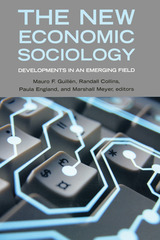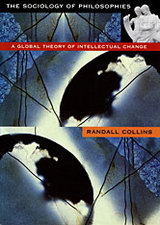2 books about Collins, Randall

The New Economic Sociology
Developments in an Emerging Field
Maruo F. Guillen
Russell Sage Foundation, 2002
As the American economy surged in the 1990s, economic sociology made great strides as well. Economists and sociologists worked across disciplinary boundaries to study the booming market as both a product and a producer of culture, tracing the correlations they saw between economic and social phenomena. In the process, they debated the methodological issues that arose from their interdisciplinary perspectives. The New Economic Sociology provides an overview of these debates and assesses the state of the burgeoning discipline. The contributors summarize economic sociology's accomplishments to date, identifying key theoretical problems and opportunities, and formulating strategies for future research in the field. The book opens with an introduction to the main debates and conceptual approaches in economic sociology. Contributor Neil Fligstein suggests that the current resurgence of interest in economic sociology is due to the way it brings together many sociological subdisciplines including the study of markets, households, labor markets, stratification, networks, and culture. Other contributors examine the role of economic phenomena from a network perspective. Ron Burt, for example, demonstrates how social relationships affect competitive dynamics in the marketplace. A third set of chapters addresses the role of gender in economic sociology. In her chapter, Barbara Reskin rethinks conventional notions about discrimination and points out that the law only covers one type of discrimination, while in recent years social scientists have uncovered other forms of hidden discrimination, which must be addressed as well. The New Economic Sociology also addresses the problem of economic development and change from a sociological perspective. Alejandro Portes and Margarita Mooney elaborate on one of the key emerging concepts in economic sociology, arguing that social capital—as an attribute of communities and regions—can contribute to economic and social well-being by fostering collaboration and entrepreneurship. The contributors concur that economic action must be interpreted through the cultural understandings that lend it stability and meaning. By rendering these often complex debates accessible, The New Economic Sociology makes a significant contribution to this still rapidly developing field, and provides a useful guide for future avenues of research.
[more]

The Sociology of Philosophies
A Global Theory of Intellectual Change
Randall Collins
Harvard University Press, 1998
Randall Collins traces the movement of philosophical thought in ancient Greece, China, Japan, India, the medieval Islamic and Jewish world, medieval Christendom, and modern Europe. What emerges from this history is a social theory of intellectual change, one that avoids both the reduction of ideas to the influences of society at large and the purely contingent local construction of meanings. Instead, Collins focuses on the social locations where sophisticated ideas are formed: the patterns of intellectual networks and their inner divisions and conflicts.
[more]
READERS
Browse our collection.
PUBLISHERS
See BiblioVault's publisher services.
STUDENT SERVICES
Files for college accessibility offices.
UChicago Accessibility Resources
home | accessibility | search | about | contact us
BiblioVault ® 2001 - 2024
The University of Chicago Press









